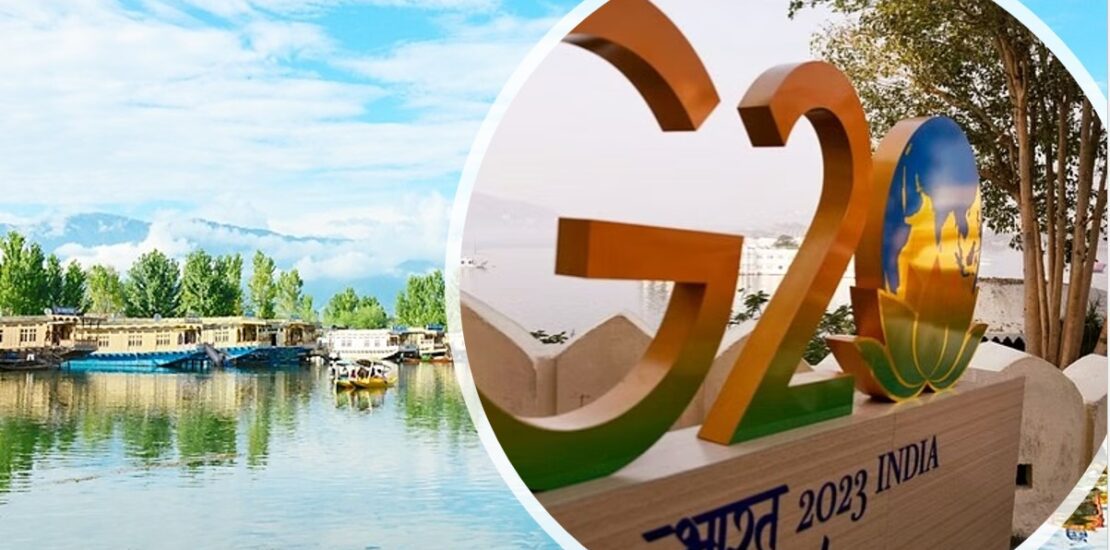G20 In Srinagar : Threats And Opportunities
- July 3, 2023
- Posted by: admin
- Categories: India, Kashmir

By: Lt Gen Syed Ata Hasnain (Retd)
With two days left for the G20 Tourism Working Group Meeting in Srinagar on May 22-24, 2023, national and international focus on this unusual event is becoming rife. There are more than 200 meetings undertaken with the G20 banner all over India, since India is the Chairman of G20 for 2023. Why then is the Srinagar meeting drawing unusually high attention? The first reason is that the mention of Srinagar throws up everyone’s concern since it’s the capital of the region where for more than 33 years a proxy war to bring about secession has been pursued by our neighbor. Pakistan continues to project the populace of J&K as a persecuted one with no human rights accorded to it. Naturally, no international event of any great worth has been held in the Kashmir Valley for as long as one can remember. A turbulent security situation made the conduct of such an event extremely risky. India as the host would not have wanted egg on the face in the past, in the event of an unpredictable security situation. There was also every chance that some local disenchanted elements of anti-national character would attempt to create an undefinable spectacle that would be projected to the international community as proof of rejection for India and the strength of separatism prevalent in J&K.
In recent years, the means of projection have become far more varied, empowering almost every individual to convey a sentiment which could be taken note of. Although the risk of negative projection has only increased with the proliferation of social media, the ground situation in the proxy war is almost completely in India’s favour. However, international events of this nature give occasion and adrenaline to anti-national elements to catch the eye of the international community and convey some unpalatable half truths about the host nation. By organizing the meeting in Srinagar India may have taken a risk. However, the decision of holding the G20 Tourism Working Group Meeting at Srinagar’s iconic Sher e Kashmir International Convention Centre (SKICC) on the banks of the Dal Lake, has all the pluses too. The sights of Srinagar are bound to bring the delegates to bouts of ecstasy. This coupled with some lip-smacking Kashmiri Wazwan (feast) is also likely to leave a lingering taste in their culinary memory; all that is on the tourism front. On the geopolitical front there cannot be a clearer message that J&K is a fully integrated part of India with no scope of anything else.
The event is surely a risk but one which is well worth it. It is almost four years since J&K’s constitutional status was changed because of some bold decisions taken by the Indian Government on 5th August 2019. With Article 370 amended, J&K has been integrated as a Union Territory (UT) with no special status under the Indian Constitution. In due course, elections to appoint a representative government will take place. Lower-level elections have already been held quite successfully. Three things have ensured a far higher level of normalcy than what existed prior to Aug 2019. First, a higher level of control on the security situation, although there have been sporadic attempts at upsetting the status quo. Second, security stabilization has given a spurt to development efforts leading to an all of government approach with better economic activity, increase in tourism and a general desire for more peace to allow the benefits of the situation to travel to all segments. Third, a people’s dimension has been activated to restore dignity, better appreciate local culture and faith and empower the people as true Indians. No one professes that complete normalcy has been restored but a huge effort is afoot and is meeting success every day. Aberrations exist with an odd bout of terrorist actions, but these are attempts at remaining relevant and continuing to keep Pakistan’s investment alive.
In this developing situation has come India’s chairmanship of G20 in which it is relevant to include all parts of India and all Indian people to correctly project India’s great diversity and true potential. India is not pushing a political agenda by including J&K as one of the locations for a working group meeting. It just happens that one of the most spectacular tourist destinations in India is J&K and that includes both – the Jammu and the Srinagar segments. These deserve greater international exposure because without J&K the projection of India’s tourism potential would be incomplete. If through the medium of the G20 Tourism Meeting more can be achieved, it would be a meaningful gain. It will lead to further stabilization and better socio-economic impact on the population. The secondary intent is to project to delegates of almost 30 countries (including those with observer status – total 150 in number) that J&K is fully integrated with India, notwithstanding a portion of territory called Pakistan Occupied Kashmir (PoK). The latter remains an aberration which will correct itself in the near future.
The G20 group is essentially a collection of nations with the largest economies and was founded in 1999 in response to several world economic crises. It works to address major issues related to the global economy, such as international financial stability, climate change mitigation, and sustainable development. Social dynamics, economics and development remain the main agenda. However, a Realist view would always assume that all that is described as the virtual charter also falls under the purview of political diplomacy. Thus, the G20 discusses the Ukraine crisis and also Taiwan because these have an effect on economies and on trade, especially during the Foreign Ministers Meeting. Each meeting of the G20 Working Groups also carries an abstract political message none of which needs to be reduced to writing. This should give a modicum of an idea how far the mere presence of G20 delegates at a host nation event is actually a political message. In the case of the Tourism Meeting in Srinagar two aspects assume importance. First, the number of nations which attend and secondly whether the event is rocked by something which robs its sheen, such as an act or a series of acts of terror in J&K in sync with the meeting. Both issues need a little elaboration.
Despite the non-political agenda of G20, a few nations have chosen not to register for the event at Srinagar; among them are Turkey and Saudi Arabia. Among the observer nations is Egypt. While Turkey may have traditionally supported Pakistan on J&K, Saudi Arabia and Egypt (both nations in recent times had their Heads of State attend India’s Republic Day as Chief Guests) have shown propensity towards supporting India. China is also keeping away. Being at odds with the majority of the member nations and with the host shows that G20 yet works at odds with itself. There is a grey zone which exists as far as political diplomacy on J&K is concerned. On balance this should not worry India too much, especially as the world order changes. Yet there are themes for opportunities which we must be prepared for. We need specialists on J&K to visit our missions abroad and continuously update them and the media in their host nations.
The second issue is of the security of the event itself and the execution of acts to draw attention of delegates and various agencies and nations around the world. The security of the event, the delegates, the various sites, hotels etc are part of the professional security set up in which no resources are being held back. From counter drone measures to counter IED drills at the sites and the routes, and access from the Dal Lake, almost every avenue and potential threat is being catered for. While none may penetrate the dragnet of high-profile security, the alternative means of messaging is a series of small terror acts in areas well away from the event location. Very few people in the world know the geography of J&K. For them an IED in Doda may seem the same as having been detonated in Pantha Chowk next to Srinagar. A terrorist attack at Poonch may perceptually be passed off as an attack near Lal Chowk. The deduction from here is clear. Indian agencies responsible for the security of the event must firstly fully secure the event sites. Second, they must cater for potential terrorist events all over J&K and mainly focus on small actions. Lastly, the media must play a very proactive role and project the correct picture factually and figuratively. It’s a great opportunity for local media who must be trusted to speak the truth.
The diatribes from Pakistan have already begun despite that nation being in serious existential crisis. Former Pakistan High Commissioner to India, Ashraf Jehangir Qazi has made a scathing attack on India in an article on Indo-Pak relations in the Dawn on May 19, 2023. The ISI and the Inter Service Public Relations (ISPR) agency are currently too busy with the crisis within. We can expect an effort to paint India red will flow from the pens and screens of veteran diplomats and a few veteran military men of the Pakistan Armed Forces.


Lt Gen Syed Ata Hasnain (Retd)
AUTHOR
Lt Gen Syed Ata Hasnain (Retd), PVSM, UYSM, AVSM, SM, VSM* former Commander of Indian Army’s Srinagar Corps, focuses on trans-national and internal conflicts in Asia and the Middle East with particular emphasis on issues revolving around radical Islam. He is the Chancellor of Central University of Kashmir and speaks extensively at Indian and international institutions on a wide variety of subjects revolving around strategic affairs and leadership. He is presently a Member of the National Disaster Management Authority (NDMA).
